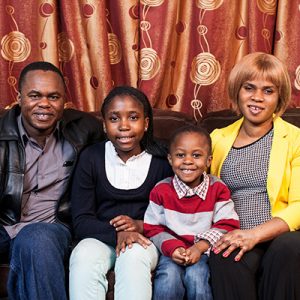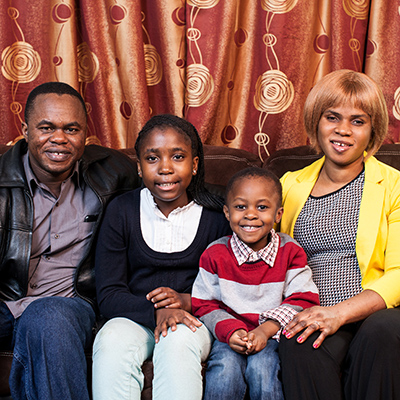 The Kamara family won’t ever forget that first shock of cold air when they arrived in Canada on a January day in 2007, but thankfully the warmth of Nova Scotians made up for it. Michael and Hannah came here with their three-year-old daughter and a nephew. They’ve since had a son, now six. The family had lived in a refugee camp in their native Sierra Leone, a country that suffered 11 years of a brutal civil war. Michael, like many victims of that war, lost his leg and didn’t even have a prosthesis until he came to Canada. “I didn’t know what Canada looked like; it was different but we were excited to have the opportunity to live here.”
The Kamara family won’t ever forget that first shock of cold air when they arrived in Canada on a January day in 2007, but thankfully the warmth of Nova Scotians made up for it. Michael and Hannah came here with their three-year-old daughter and a nephew. They’ve since had a son, now six. The family had lived in a refugee camp in their native Sierra Leone, a country that suffered 11 years of a brutal civil war. Michael, like many victims of that war, lost his leg and didn’t even have a prosthesis until he came to Canada. “I didn’t know what Canada looked like; it was different but we were excited to have the opportunity to live here.”
In his homeland he was a tailor and his wife sold clothes. She now works as a housekeeper at a downtown hotel. Michael worked as a hospital attendant and then decided to drive a cab – a job that provides him the flexibility to pick up his son from school and care for him until his wife comes home from work.
They participated in the formation of a Sierra Leone/Canada Association that meets monthly. “We speak our language; we eat our meals; we make fun and laugh. Our children know each other. Even if they’re born here, they know they are part of something else.” And they fundraise to help people suffering in Sierra Leone, especially those who have lost a limb to war. Michael saved $50 a month toward travel to his homeland to visit family and find ways to assist. He provided school supplies, such as books and pens, and helped a young man receive necessary surgery. He is now collecting school supplies to fill a container. “Canada changed my life. Now I ask how I can change other people’s lives.”
Language has been a major challenge. Hannah studied at ISANS and practices her English at work. “My teacher said not to be shy and I’m not shy to talk to guests.” Michael appreciates the opportunity to tell people about Sierra Leone. “People in my cab want to know who I am and where I’m from so I like to educate them.”
They are comfortable in their home; their daughter plays soccer and they enjoy family outings. “You miss your food, your language, your culture – how you interact with other people – but you’re still happy to be here,” says Michael. Hannah notes that at home extended family and neighbours take care of each other’s children. “But I am happy here — happy to have an opportunity to have education and a job and have rights as a woman.”
Michael finished adult high school here and still has plans to go to college and study business. They hope one day to operate a business together. “I had to stop school because I struggled so much,” he says. “I don’t want my children to follow in the same footsteps. I want them to get the best education and to satisfy themselves for the future.”
